
Revision note:We have added information about alternate takes and overdubbings on the Blazes' recordings for United. Specifically, "Please Send Her Back to Me" was released on Delmark DE-704 without Eddie Chamblee's overdubbed tenor sax, while the original release on United 127 included the overdub. A close comparison with United 146 and United 177 further shows that Delmark CD used alternate takes of "Not Any More Tears" and "Do the Do."
The Four Blazes with whom we will be primarily concerned were founded in Chicago 1940 by drummer Paul Lindsley "Jelly" Holt, who was already a veteran of hot string groups like the Five Rhythm Rocketeers (1937 - 1938). The other charter members were Jimmy Bennett and William "Shorty" Hill (guitar, tipple, ukulele, mandolin) and Prentice Butler (bass). All of them sang and did impressions. In 1941, Floyd McDaniel (born 1915), who was already a veteran of the Swing scene, switched from acoustic to electric guitar and replaced Bennett (thanks to Joseph Scott for pointing us to this information). According to the Chicago Defender for December 20, 1941, the 4 Blazes were holding down a gig at Martin's Corner, the prominent West Side club at 1900 West Lake. The ad notes that the group was "formerly the Four Dusty Demons."
Different members of the group served as contractor on different occasions; only a minority of the contracts approved and filed by Musicians Union Local 208 were in the name of the group. On February 18, 1943, Prentice Butler's indefinite contract with the Whirlaway Lounge was accepted and filed by Local 208; on July 1, he filed another indefinite contract with the same establishment. On October 21, Butler posted a contract for 8 days at the 1111 Bryn Mawr Club.
On January 20, 1944, the group posted another contract with the 1111 Bryn Mawr Club, for 4 weeks with an option for another 4; Floyd McDaniel was now listed as the leader. The option was picked up, because McDaniel posted another 4-week contract on February 17. The group got into some kind of trouble with the Union local in August; the Board meeting minutes for August 17, 1944 stated that "Floyd McDaniels [sic] and his FOUR BLAZES shall be notified to appear before the Board for investigation September 7, 1944" (p. 1). Whatever it was, it got straightened out, because the Four Blazes posted a group contract for 4 weeks at radio station WJJD on October 19.
The Four Blazes became Five when they added Ernie Harper, a piano player from Pittsburgh, in 1945. They also used Edward "Duke" Groner on bass at some point between 1943 and 1946; at least Groner recalled working with them in his interview with the late Charles Walton (see Bronzeville Conversations). Since Groner had broken in as a ballad singer, he would have been self-recommending as far as the Blazes were concerned. (For more on Duke Groner, see our Buster Bennett page.)

There has been a good deal of confusion about when the Four Blazes became Five, because a Los Angeles-based group called itself the the Four Blazers and the Hollywood Four Blazes. To make things even more confusing, it recorded a "Chicago Boogie" of its own. The LA-based outfit made commercial recordings in 1944 and 1945, and appeared on Armed Forces Radio Services broadcasts in 1945, 1947, and 1948. See Appendix A for brief history and discography of this other group.
Our Blazes were touring during much of 1946. After returning to Chicago in the fall, Prentice Butler got into trouble with Musicians Union Local 208 for accepting a last-minute job with guitarist Ernest Ashley after allowing his membership in Local 208 to lapse.
Mr. Buckner [Local 208 Treasurer] stated that Butler had owed his office $21.60 delinquent tax since last January 7, 1946. Butler left Chicago with the Four Blazes and he did not hear from him until June, even though he had tried several times to contact him through various locals in whose jurisdiction the act was playing. (Local 208 Board meeting minutes, November 7, 1946, p. 3)
From the Local 208 case it appears that the Blazes were performing in Washington DC, among other places. Butler was fined $25 for taking the gig with Ashley after becoming an "erased" member of Local 208.
Butler must have paid his fine promptly, for on December 19, 1946, the Five Blazes posted a contract with the Tailspin Lounge, for 2 weeks with options.
The Five Blazes finally entered a recording studio in April 1947, when they were the second act to cut sides for a brand-new independent called Aristocrat.
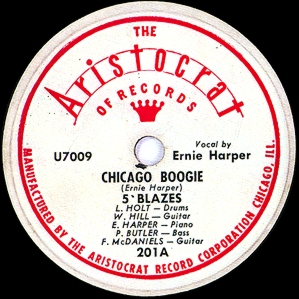
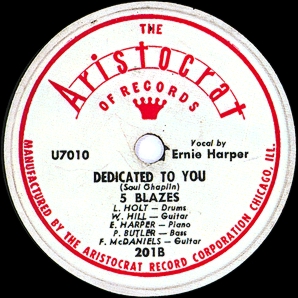
Ernie Harper (p, voc); Floyd McDaniel (eg, voc); William "Shorty" Hill (eg, voc); Prentice Butler (b, voc); Paul Lindsley "Jelly" Holt (d, voc).
Universal Recording, Chicago, April 1947
| U7008-V | All My Geets Are Gone [FMcD voc] | Aristocrat 202A, Document DOCD-5615 | |
| U7009-V | Chicago Boogie [EH voc] | Aristocrat 201A, Chess CHD2-9387 [CD], Document DOCD-5615, MCA 380-596 [CD] | |
| U7010-V (U7010*) | Dedicated to You [EH voc] | Aristocrat 201B, Aristocrat 2003B*, Document DOCD-5615 | |
| U7011-V | Every Little Dream [EH, ens voc] | Aristocrat 202B, Document DOCD-5615 |
The personnel is listed on the labels to Aristocrat 201 and 202 (all of it accurate except that Floyd's surname comes out "McDaniels"). "Chicago Boogie" was also reissued in 1999 on Chess MCA 380-596, a 15-CD extravaganza titled The Chess Story 1947-1975. Document DOCD-5615, Secular Vocal Groups Vol. 4, was released in 1998. (See above for the misattribution of two other tracks on the Document CD to these Five Blazes.)
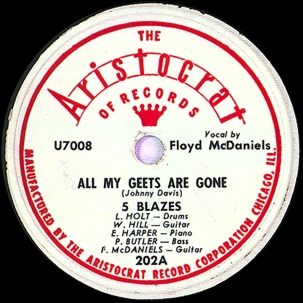
Our information derives from our Aristocrat discography. Matrix numbers U7009 and U7010 have been confirmed from a copy in the collection of Dan Kochakian. A copy in the collection of Daniel Gugolz has the V suffixes. Matrix numbers U7008 and U7011 are confirmed from a copy in the collection of Daniel Gugolz; Tom Kelly's copy has the V suffixes.
According to George R. White, Aristocrat 201 was released in May 1947 and Aristocrat 202 appeared in June 1947. Dan Kochakian recently confirmed the strange reissue of "Dedicated to You" on the B side of Aristocrat 2003, a Sax Mallard single released in February 1949. Apparently the remaining item that Mallard and company had recorded for Aristocrat ("Insurance Man Blues") was deemed unsatisfatory for some reason. The A side of this hybrid release was "Evelyn" by Mallard's group. The reissue of "Dedicated to You" gives Ernie Harper top billing.
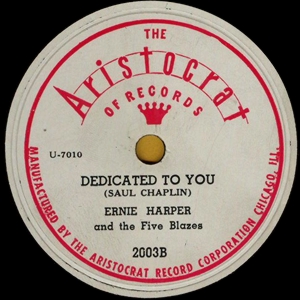
The sales that Aristocrat racked up with 201 and 202 led the label to sign other "race" artists, starting with Jump Jackson--a decision that turned out to be critical to the label's survival.
During this period, The Blazes alternated between stays in Chicago and spells on the road. The band was working the Shay Lounge in November 1947 (contract for two weeks posted on November 6, in the name of "Lindsley" Holt). On November 20, they posted a contract for 2 weeks with options at the Bar o' Music, in Ernie Harper's name. January 1948 found them at Club Detour (contract for 2 weeks with options accepted and filed on January 22, in Harper's name). On May 6, "Lindsley" Holt filed two "indefinite" contracts, one with Leo's Cocktail Lounge and one with Rotchild Melody Casino. In October 1948 they were at the Brass Rail in the Loop. Pat Harris in "Chicago Band Briefs" remarked that "The Brass Rail has the Four Blazes (not to be confused with Johnny Moore's unit) for a while..."Down Beat, November 3, 1948, p. 4).
Ernie Harper left the group and was not replaced. The Delmark liner notes say that this happened around 1950, but Local 208 contract lists indicate that he left much earlier. On June 17, 1948, Harper filed a contract with Mooney's Lounge, for two weeks with options. He may have filed as the nominal leader of the Blazes, instead of as a soloist. However, he was definitely gone when the Four Blazes filed a contract on July 15 for 10 nights at Club Silhouette. Harper next showed up at the Tailspin Lounge in September; his contract for 2 weeks and 3 days there was accepted and filed by Local 208 on September 16.
A sampling of Harper's musical activities after he left the group can be had from an article by Pat Harris ("'Music Superb, Atmosphere Ideal' at Chi's Streamliner,"Down Beat, November 2, 1951, p. 5). At the Streamliner, Ernie Harper played and sang, did some duets with pioneering Hammond organist Les Strand, and accompanied jazz singer Lurlean Hunter. Occasionally he jammed with the entire ensemble, which also included singer Lucille Reed. After praising Harper's work behind Hunter, Harris noted that
Tunes Ernie does on his own are nothing to ignore, either, ranging from an extended tour through the House of Blue Lights to a delicately played and sung Slow Leak, a lovely number.
The favorable press didn't translate into a lot of recording opportunities for Harper. He worked at least for a while with a later edition of the vocal/instrumental group, the Four Shades of Rhythm, recording with them for Chance in 1952. We don't know whether he had anything to do with the Four Shades' session for Mad in 1957.
The group next worked at the Bar o' Music (1 week contract under "Lindsey" Holt's name, filed September 2, 1948). Next, they moved to the Sky Club ("indefinite" contract under Lindsley Holt's name filed on September 16). On October 21, "Lindsay" Holt posted a 4-week contract with the Capitol Lounge.
Prentice Butler died around 1950 (according to Grendysa, although if Tommy Braden was his immediate replacement on the string bass, a 1951 date would be indicated). In March 1951, Tommy Braden arrived in town with saxophonist J. T. Brown's band, which was freshly returned from a tour of the South (King Kolax toured with this same band, which also included Ernest Ashley on guitar, Art Tarry on piano, and Hillard Brown on drums). The J. T. Brown band had picked up Braden at a club in Chattanooga, Tennessee. Very likely Braden continued in Brown's band for some time after it returned to Chicago. We know that he is not on Brown's July 12, 1951 session for United, which features prominent slap-bass work, so by then he had probably joined the Blazes.
Though a native of Chattanooga, Braden had already tested the Chicago scene; on December 24, 1949, a Defender advertisement for the Back Door Lounge at 5859 South State Street mentioned a "limited engagement" by Ernest Ashley and His Three Naturals, with Raymond Walters on piano and Tommy Braden on bass. (Ashley had previously hired Prentice Butler, as we saw above.) The Three Naturals were said to be "direct from the Nicolette Hotel." Braden's singing and songwriting would be central to the Blazes' sound for the remainder of their time together. His prominence would make for some tensions within the group, but these took time to develop.
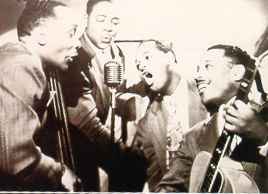


Floyd McDaniel (eg, voc); William "Shorty" Hill (eg, voc); Tommy Braden (b, voc); Paul Lindsley "Jelly" Holt (d, voc); with unidentified (cl -1) and Eddie Chamblee (ts -2).
Universal Recording, Chicago, January 4, 1952
| 1057 | Mood Indigo (Ellington) [ens voc] -1 | United 114, P-Vine Special [J] PLP 9044, Delmark DE-704, United U-114 [CD] | |
| 1058-7 | Mary Jo (Braden) [TB, ens voc] -2 | United 114, P-Vine Special [J] PLP 9044, Delmark DE-704, United U-114 [CD] |
These two numbers were recorded by Bill Putnam at Universal, then sold to United. United 114 was released in March 1952; by August 1952, "Mary Jo" was #1 on the R&B charts. Later pressings of United 114 add the names of all four members of the Blazes (with "F. McDaniels" for Floyd McDaniel) and give a credit "Lead Vocal - T. Braden" at the bottom of the "Mary Jo" side. The second pressing (on the original United label) also credits "Lead Vocal - L. Holt" on "Mood Indigo"; pressings on the later United label leave this off.
We used to think that Eddie Chamblee played clarinet on "Mood Indigo," but Bob Porter has convinced us that this is unlikely. Who else might have been available to play session clarinet is unclear. The playing on Mood Indigo is consistent with Sax Mallard's style on the instrument, but we have no positive evidence of his involvement. Whoever it is, it is almost certainly not the same person who played the uncredited clarinet on "Air Mail Special" from the session of August 17, 1953.


P-Vine Special PLP 9044 was a Japanese release from 1982 titled Blazes & Dozier Boys: Swingin' and Singin' in the series Black Music of the 50's: Volume 12. This was a collection of United / States material leased from Delmark; 6 tracks were by The Four Blazes and 6 were by the Dozier Boys. Only the P-Vine gives take numbers for the Four Blazes. The P-Vine release actually preceded the first Delmark by 15 years, in the case of the Four Blazes (and to this day there has never been a Delmark release on the Dozier Boys.) United U-114 is a bootleg CD from 1997 titled Rare Windy City R&B & Early Vocal Groups Vol. 3. The first 12 tracks are a straight dub of the P-Vine, albeit in a different order; the remaining 13 consist of more by the Blazes and tracks by Tommy Dean, Paul Bascomb, Helen Thompson, and Gloria Irving with Sax Kari. Session information derived from Delmark DE-704, a CD issued in 1997 under the title The Four Blazes: Mary Jo. The clarinetist on "Mood Indigo" (who has resisted identification) is not noted there. Original United catalog numbers mostly filled in from Bob Koester's discography of the United/States labels (Blues Unlimited, Jan.-Feb., 1977) and Fernando L. Gonzalez's Disco-File, 2nd edition, 1977.
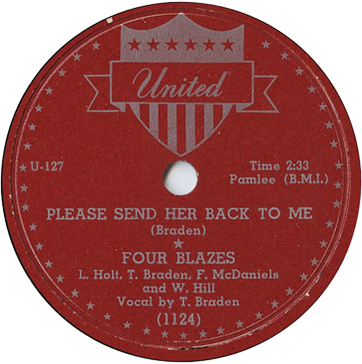
Floyd McDaniel (eg, voc); William "Shorty" Hill (eg, voc); Tommy Braden (b, voc); Paul Lindsley "Jelly" Holt (d, voc); with Eddie Chamblee (ts except -1).
Universal Recording, Chicago, July 4 and August 18*, 1952
| 1122-19 1122-2 in the vinyl |
Night Train [JH, ens voc] -1 | United 125, P-Vine Special [J] PLP 9044, United U-114 [CD], Delmark DE-704 | |
| 1123-1 | Rug Cutter [FM, ens voc] | United 125, P-Vine Special [J] PLP 9044, United U-114 [CD], Delmark DE-704 | |
| 1124 [no overdub] | Please Send Her Back to Me (Braden)* [TB, ens voc] -1 | Delmark DE-704 | |
| 1124 | Please Send Her Back to Me (Braden)* [TB, ens voc] | United 127, United U-114 [CD] | |
| 1125 | Stop Boogie Woogie (no composer credit) -1 [FM voc] | United 127, United U-114 [CD], Delmark DE-704 | |
| 1126 | Perfect Woman* [TB voc] | Delmark DE-704 |
We got our session information from Delmark DE-704, a CD issued in 1997 under the title The Four Blazes: Mary Jo. The liners identify 1127 as a Four Blazes title from this session, but in fact no artist or title is documented for this matrix—it may not have been used at all.
United 125 was released in August 1952; it gave the take number for "Night Train" as 1122-2, in part to avoid embarrassment, and the take number for "Rug Cutter" as 1123-3 (even though 1123-1 appears to be the issued take). United 127 followed in September of that year. The original label of United 127 incorrectly gives "1025" instead of 1125 as the matrix for "Stop Boogie Woogie."
Dani Gugolz's research with dubs provided by Victor Pearlin has now established that "Please Send Her Back to Me" released on Delmark DE-704 (with no tenor sax) is the same take that was originally released on United 127, minus the Eddie Chamblee overdub.
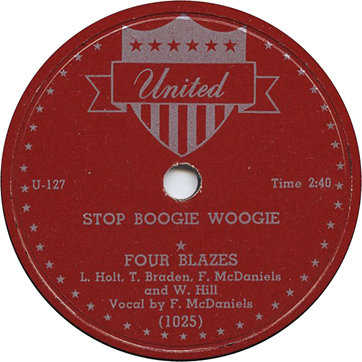
"Perfect Woman" was not released at the time, presumably because of the weird sound produced by overdubbing a second Eddie Chamblee sax line over one already "enriched" with excessive studio reverb. (Bob Koester's United/States label discography has the cryptic notation "Sax Dub-In Coca Cola" for matrix 1126. The perfect woman was supposed to be shaped like a Coca Cola bottle... Apparently the overdub was done on August 18, 1952; Koester notes that "Please Send Her" was also remade on August 18.) "Perfect Woman" would be redone from scratch at the next session. "Stop Boogie Woogie" was a guitar feature for Floyd McDaniel, with no tenor sax line added—so there was no need for a remake. Presumably no composer was credited because the number is a variant of "Pinetop's Boogie Woogie."
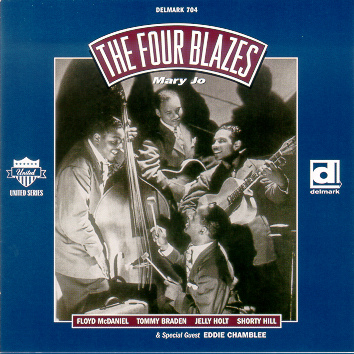

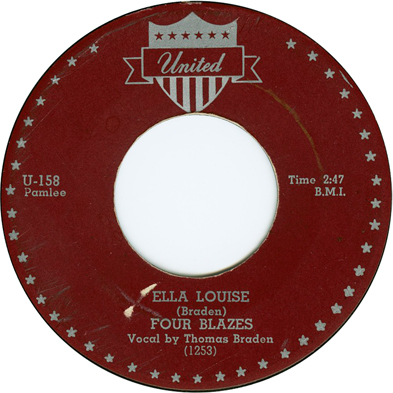
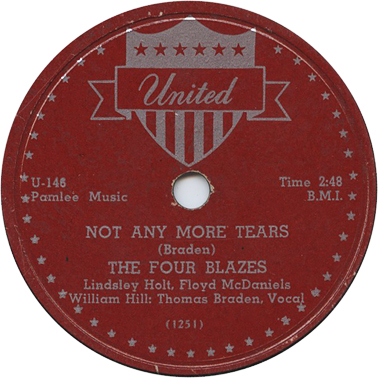
Floyd McDaniel (eg, voc); William "Shorty" Hill (eg, voc); Tommy Braden (b, voc); Paul Lindsley "Jelly" Holt (d, voc) with Eddie Chamblee (ts).
Universal Recording, Chicago, February 3, 1953
| 1251 [alt.] | Not Any More Tears (Braden) [TB voc]^ | Delmark DE-704 | |
| 1251 | Not Any More Tears (Braden) [TB voc]^ | United 146, United U-114 [CD] | |
| 1252-6 1252-2 in vinyl |
My Hats [sic] on the Side of My Head (Williams) [TB voc]^ | United 146, P-Vine Special [J] PLP 9044, United U-114 [CD], Delmark DE-704 | |
| 1253 | Ella Louise (Braden) [TB, ens voc] | United 158, United U-114 [CD], Delmark DE-704 | |
| 1254 | Perfect Woman (Braden) [TB voc] | United 158, United U-114 [CD], Delmark DE-704 | |
| 1255 | Caravan (Ellington-Tizol) % | Delmark DE-542 [CD] | |
| 1256-2 | It Ain't Necessarily Blues % | Delmark DE-542 [CD] | |
| 1257 | Snag the Britches [ens voc] | Delmark DE-704 | <
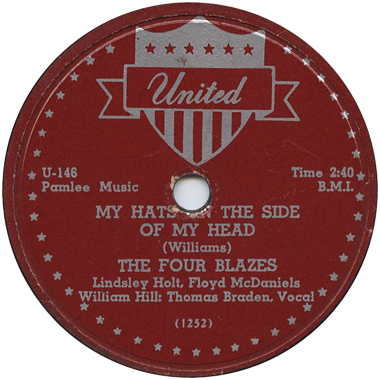
Session information from Delmark DE-704, a CD issued in 1997 under the title The Four Blazes: Mary Jo. 1255 and 1256 were instrumentals by Eddie Chamblee with accompaniment by the Blazes. They were finally issued in 2002 on Delmark DE-542, a CD collection titled Honkers and Bar Walkers Volume 3.
United 146 was released in March 1953; Billboard mentioned it among "New Records to Watch" on March 21, 1953 (p. 38), then put the record in "This Week's Best Buys" for April 4 (p. 30). United 158 came out in September 1953. On United 146, the matrix number for "My Hat's on the Side of My Head" was given as 1252-2, but 1252-6 appears to be the issued take.
Comparing the version of "Not Any More Tears" on Delmark DE-704 with a dub of United 146 provided by Victor Pearlin, Dani Gugolz has established that the Delmark release uses a different take.

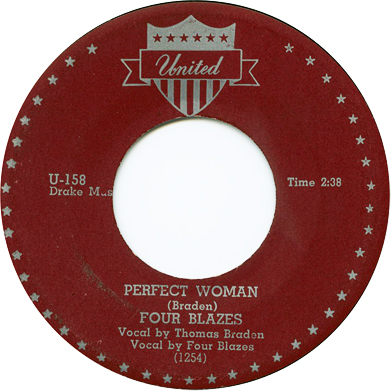


Floyd McDaniel (eg, voc); William "Shorty" Hill (eg, voc); Tommy Braden (b, voc); Paul Lindsley "Jelly" Holt (d, voc) with Eddie Chamblee (ts) and unidentified (cl -1).
Universal Recording, Chicago, August 17, 1953
| 1361 | Never Start Living [TB voc] | Delmark DE-704 [CD] | |
| 1362 | Lovin' Man [TB voc] | Delmark DE-704 [CD] | |
| 1363-8 | My Great Love Affair (Braden) [TB voc] | United 168, P-Vine Special [J] PLP 9044, United U-114 [CD], Delmark DE-704 [CD] | |
| 1364 | Air Mail Special (Christian-Goodman-Mundy) % | Delmark DE-542 [CD] | |
| 1365 | All Night Long (Burros Samba) [ens voc] | United 168, United U-114 [CD], Delmark DE-704 [CD] | |
| 1366-4 | Raggedy Ride [TB voc] | Delmark DE-704 [CD], Delmark DE-775 [CD] |
Our information is derived from Delmark DE-704, a CD issued in 1997 under the title The Four Blazes: Mary Jo. 1363 was titled just "Love Affair" on Japanese P-Vine Special PLP 9044, a 1982 release of material by the Four Blazes and the Dozier Boys. The United catalog numbers were filled in from Bob Koester's discography of the United/States labels and Fernando Gonzalez's Disco-File, 2nd edition, 1977. "Raggedy Ride" has been subsequently reissued on Delmark DE-775, a compilation titled The United Records Story. Delmark 775 gives the take number as -4 and Dani Gugolz has confirmed the same track was used on Delmark 704.
"Air Mail Special" was an instrumental (like the Benny Goodman/Charlie Christian original). An unidentified clarinetist (definitely not Sax Mallard this time) tries to sound like Benny, affecting a fair Goodmanite rasp, and Floyd McDaniel plunks heavily on the strings in a tribute to Charlie Christian. "Air Mail Special" was issued for the first time in 2002 on Delmark DE-542, Honkers and Bar Walkers, Volume 3, which includes nearly all of Eddie Chamblee's recordings for United.
According to the United bootleg, United 168 came out in January 1954.


Three more Eddie Chamblee numbers were cut at this session after "Raggedy Ride," but on these, Chamblee used his regular rhythm section: John Young, piano; Walter Scott, guitar; Ernie Shepard, bass; and Osie Johnson, drums. After he quit working with the Blazes in the studio, Chamblee would cut one more session of his own for United on July 30, 1954.
After 4 sessions that were released as by the Four Blazes, what was largely the same group made two more. Only one guitar can be heard on these tracks; apparently Shorty Hill had left. Also, there is an uncredited pianist. According to Peter Grendysa, the Four Blazes played some gigs around this time with a white organist named Gordon Fairholt—but there is no evidence Fairholt was responsible for the piano work in the studio. Moreover, a publicity photo for the Blazes (reproduced in the notes to the United bootleg) shows a five-man lineup including Shorty Hill and a black pianist. And there is at least one 1953 Chicago Defender advertisement for the "Five" Blazes. What's more, the session saxophonist for the last two was Red Holloway, not Eddie Chamblee as claimed in all previous accounts.
Only two singles were released from these sessions: United 177 and 191.

Tommy Braden (b, voc); poss. Norman Simmons (p); Floyd McDaniel (eg); Paul Lindsley "Jelly" Holt (d); with James "Red" Holloway (ts).
Universal Recording, Chicago, April 13, 1954
| 1436 | Drunken Blues | Delmark DE-704 [CD] | |
| 1437 | She Needs to Be Loved (Allen) % | United 191, Delmark DE-704 [CD] | |
| 1438 [alt.] | Do the Do (Allen)^ | Delmark DE-704 [CD] | |
| 1438 | Do the Do (Allen)^ | United 177, United U-114 [CD], Delmark DE-704 [CD] | |
| 1439 | Did You Ever See a Monkey Play a Fiddle (Braden)^ [TB, ens voc] | United 177, United U-114 [CD], Delmark DE-704 [CD] | |
| 1440 | Don't Lose Your Cool [TB, ens voc] | Delmark DE-704 [CD] |
Lord gives no personnel for this session, just titles, matrix numbers and date. The group identification and titles are from a copy of United 177 in the late Otto Flückiger's collection. Lord gives the title of 1439 as "Did You Ever See a Monkey?"; on Delmark DE-704 and the United bootleg, the title is correct. Delmark has 1440 as "Don't Lose Your Cool," while Lord (following Koester's 1977 United / States listing) has it as "Lose Your Cool." United 177 was released in May 1954. United 191 was released in late 1955.
Comparing the vesrion of "Do the Do" released on the Delmark CD with a dub of United 177 provided by Victor Pearlin, Dani Gugolz has concluded that different takes were used.

All tracks from this session were included in Delmark DE-704, The Four Blazes: Mary Jo, a CD issued in 1997. The initial releases are not identified on the Delmark reissue; there is no mention that they came out under Tommy Braden's name.
The pianist is not identified in any source known to us. He sounds like Norman Simmons, who was doing a good deal of session work at the time. Meanwhile the tenor saxophonist has a lower-pressure delivery than Eddie Chamblee did. Daniel Gugolz has identified him as Red Holloway, who was extremely active on sessions at this time, particularly with Al Smith groups.
The turnover in the group is easier to understand when we note a short item in the Chicago Defender for April 24, 1954. Tommy Braden had become restless. The headline, in fact, was "Four Blazers Lose Ace Vocalist Tommy Braden." Dave Clark's story states that Braden was leaving to form his own group, called the Tommy Braden Quintet. (Braden was booked into the Strand Lounge with his new group toward the end of May; his contract was posted with Local 208 on June 3.)

The Four Blazes went on with other vocalists for a while, but Braden was back with them by New Year's 1955, when the reconstituted band was featured at Joe's Los Angeles Bar (6223 Cottage Grove) The adjustments to Braden's billing on the group's last two United releases were obviously made in response to his dissatisfaction.
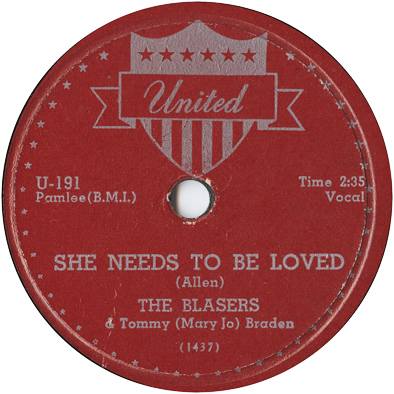
poss. Norman Simmons (p); Floyd McDaniel (eg); Tommy Braden (b, voc); Paul Lindsley "Jelly" Holt (d); with Red Holloway (ts).
Universal Recording, Chicago, July 11, 1955
| 1543 | Done Got Over (Braden) [TB, ens voc] | United 191^, Delmark DE-704 [CD] | |
| 1544 | Women, Women [TB, ens voc] | Delmark DE-704 [CD] |
Lord gives no personnel and attributes the session to Tommy Braden. He mentions two unidentified titles from this session, but these were actually by Tab Smith, who cut matrix numbers 1545, 1547, 1548, and 1549 at the same date. But these were done with his own band (see the notes to Delmark DL-429, the Tab Smith LP which was released in 1976, and our United page).
United 191 was released late in 1955. Though Delmark DE-704, The Four Blazes: Mary Jo, includes the two Blazes tracks from this session and gives correct matrix numbers, the Delmark notes never mention this session or give its date.
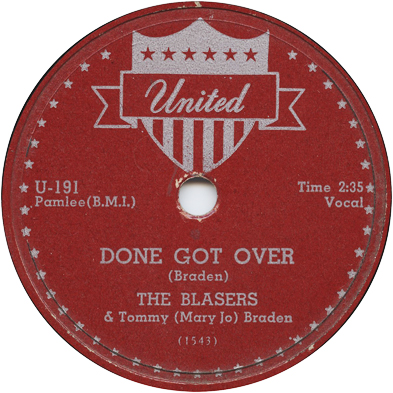
The reconstituted Blazes broke up for good later in the year. Tommy Braden's career as a leader turned out to be short; he died toward the end of 1957.
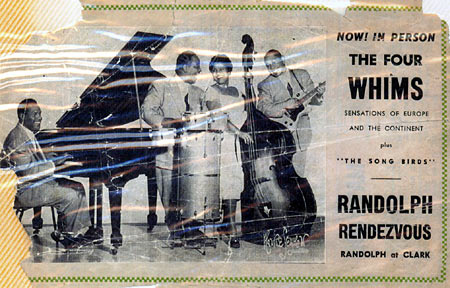
Meanwhile, Jelly Holt started a new vocal/instrumental group. From 1955 to 1957, the Four Whims consisted of James Wright, piano; Frankie Rue, guitar; Dorothy Davis, bass; and Jelly Holt, cocktail drums. There may have been a pianist or two before Holt invited Wright to join the group. Home base for the Whims was the Randolph Rendezvous, at Randolph and Clark, where Holt also tended bar; the Whims were on Wednesday through Sunday nights, from 9 pm till 4 am. When interviewed by the late Charles Walton (see Bronzeville Conversations), Wright recalled the routine as follows:
The Whims worked 30 minutes on and 30 minutes off. Alternating with our group were girl singers accompanied by pianists such as Gene Esposito, Fred Kaz, Joe Iaco, or Kenny Sweet. The girl singers also served as hostesses. Some great girl singers came out of that period.
At Wright's suggestion, Holt instituted a weekly jam session at the Rendezvous, which ran on Sundays from 3:30 to 9 pm (apparently by this time Local 208 had finally relaxed its efforts to keep jazz musicians from jamming). After an impressive performance by Barrett Deems on the cocktail set, Holt broke down and purchased a full drum set to attract more drummers to the sessions. At its height, the Rendezvous drew such touring musicians as Duke Ellington, Johnny Hodges, and a very young Roland Kirk, making first visit to Chicago.
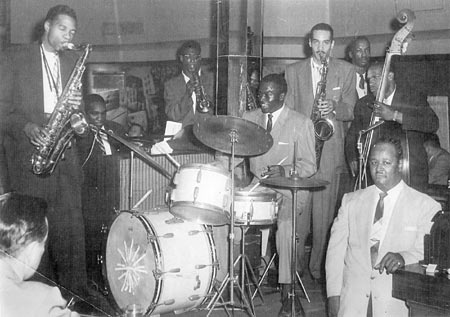
Wright recalled that Holt was fully capable of outconning Al Smith:
Jelly Holt was a very unusual person. He was the biggest liar in the world, could talk his way into and out of anything. He also was a showman. He would tell the story of Chicago while I would played [sic] the tune “After Hours” in the background.
He would tell about when Chicago was swinging and when jazz was the thing. He talked about all the gangsters and the speakeasies in town. According to Jelly, you would have to know him to get into the speakeasies. When you knocked on the door, a voice would ask, “Who is it?” You would answer, “ Jelly sent me,” and you would be welcomed inside.
In fact, Holt managed to convince more than one bar patron that he had written Duke Ellington and Billy Strayhorn's hit song "Satin Doll."
Jelly Holt retired from music in the early 1960s.
Floyd McDaniel continued on the scene, putting in some years with a latter-day edition of The Ink Spots, until Chicago blues fans noticed that he was still around in the 1980s; he made at least one CD after his "rediscovery." He died in 1995.
Eddie Chamblee died in a nursing home in New York City on May 1, 1999; see his obituary in Blues & Rhythm, December 1999. Red Holloway died on February 25, 2012, in San Luis Obispo, California.
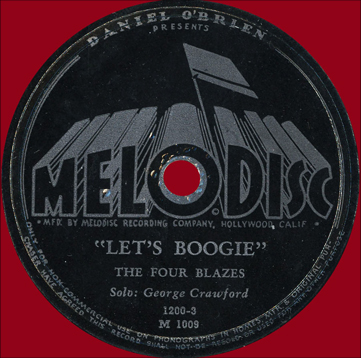
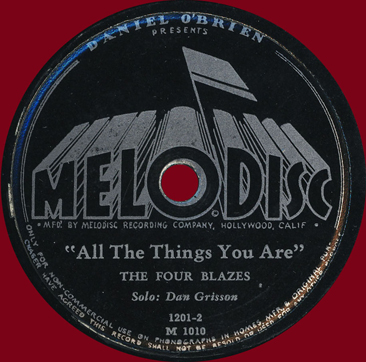
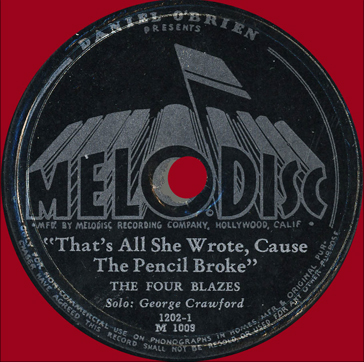
George Crawford (p, voc); Ulysses Livingston (g, voc); LeGrand Mason (b, voc); Connie Jordan (d, voc); Dan Grissom (voc -1).
Los Angeles, early 1944
| 1200-3 | Let's Boogie | Melodisc 1009, Acrobat ADDCD 3066 | |
| 1201-2 | All the Things You Are -1 | Melodisc 1010 | |
| 1202-1 | That's All She Wrote, Cause the Pencil Broke | Melodisc 1009, Acrobat ADDCD 3066 | |
| 1203-2 | Chicago Boogie -1 | Melodisc 1010 | |
| 1204 | Jack, You Just Ain't Booted* | Melodisc 1011 | |
| 1205-2 | Snoqualimie [sic] Jo Jo (Greene)* | Melodisc 1011 |
Melodisc misspelled guest vocalist Dan Grissom's name on both sides of 1010. The company wasn't too clear on the spelling of "Snoqualmie," though the songwriter appears to be responsible for the extra "i"; the number was also recorded by the Town Criers for ARA. The song also refers to Wenatchee, so real towns in Washington were presumably intended.
Acrobat ADDCD 3066 is a 2-CD compilation from 2010 covering the history of the Melodisc label.
"Snoqualmie Jo Jo" and "Jack You Just Ain't Booted" can be heard at http://www.vocalgroupharmony.com/3ROWNEW/SnoqJoJo.htm.
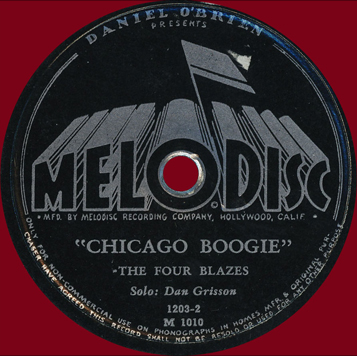
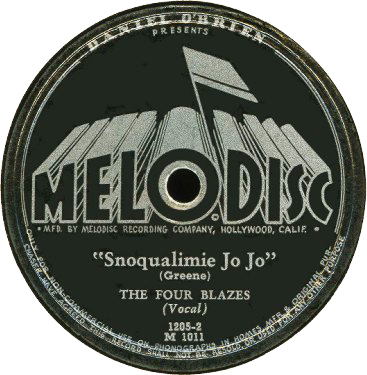
George Crawford (p, vcl) Ulysses Livingston (g, vcl) LeGrand Mason (b, vcl) Connie Jordan (d, vcl); Dan Grissom, vcl -1
C. P. MacGregor Studio, Los Angeles, 1944/45
| MMo860 | Theme: Longhair's Nightmare | Lib. No. 309 | |
| Good Little Ol' Deal | Lib. No. 309 | ||
| Push Over | Lib. No. 309 | ||
| Dark Eyes | Lib No. 309 | ||
| MMo861 | I'm In The Mood For Love -1 | Lib. No. 310 | |
| Oh, Boy, That's Where My Money Goes | Lib. No. 310 | ||
| All The Things You Are -1 | Lib. No. 310 | ||
| Let's Boogie | Lib. No. 310 |
An 8-title transcription of The Hollywood Four Blazes, prepared for radio play, was made by C. P. MacGregor Studio in Los Angeles. This a 16-inch 33 1/3 rpm (but not microgroove) disk. We know of two copies. One is in the collection of Richard Reicheg, who provided the information shown here. The other is owned by Dr. Michael Arie. Each side of the disk has a Library Catalog Number in large print, and what appears to be a matrix number in smaller print.
We don't have an exact date on the MacGregor transcription, but personnel (Dan Grissom is involved) and repertoire seem to put it between the Melodisc session and the Excelsior session.
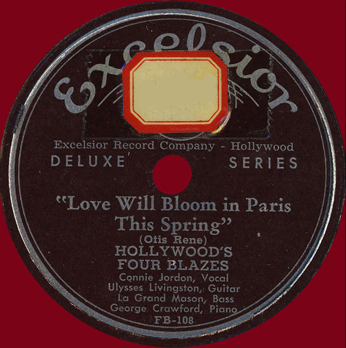
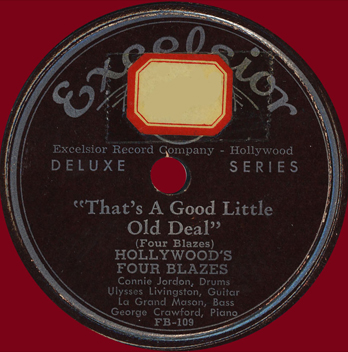
George Crawford (p, voc); Ulysses Livingston (g, voc); LeGrand Mason (b, voc); Connie Jordan (d, voc).
Hollywood, March 16-19, 1945
| FB-108 | Love Will Bloom In Paris This Spring (Otis Reneé) | Excelsior FB-108 | |
| FB-109 | That's a Good Little Old Deal (Four Blazes) | Excelsior FB-109 | |
| FB-110 | I Never Had a Dream to My Name (Otis René-Paul Webster) | Excelsior FB-110, Acrobat ADDCD 3066 | |
| FB-111 | The Big Leg Mama's Fine (Four Blazes) | Excelsior FB-111, P-Vine PCD-5779, Acrobat ADDCD 3066 |
P-Vine PCD-5779 a CD titled The Best Of Jive Vocal Groups 2; Acrobat ADDCD 3066 is a 2-CD compilation from 2010 covering the history of the Melodisc label.
"That's a Good Little Old Deal" and "The Big Leg Mama's Fine" can be heard at http://www.vocalgroupharmony.com/ROWNEW2/TheBigLg.htm. For a little more about the Excelsior label, see http://www.vocalgroupharmony.com/Excelsor.htm.
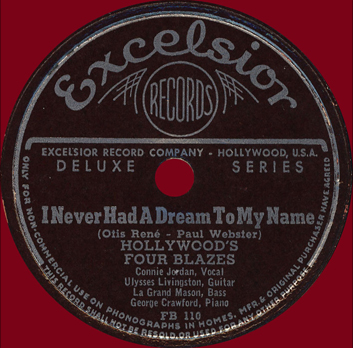
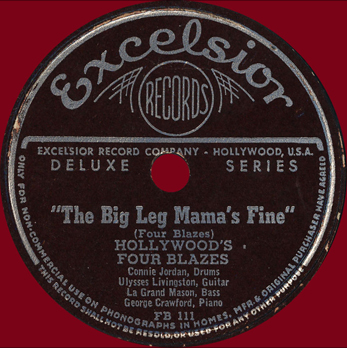
The quartet was now picked up by the Armed Forces Radio Service, which recorded material for its Jubilee broadcasts in Southern California. Most of the group's remaining opportunities to record would be with AFRS.
George Crawford (p, voc); Ulysses Livingston (g, voc); LeGrand Mason (b, voc); Connie Jordan (d, voc); Ernie "Bubbles" Whitman (MC).
Hollywood, March 1945
| That's a Good Little Old Deal | AFRS Jubilee 125, AFRS Jubilee 219, Joyce LP 5007 | ||
| Boogie Woogie Billy | AFRS Jubilee 136, AFRS Jubilee 222, Country Routes RFD CD 10, RST 1012 [CD], P-Vine [J] PCD-5779 | ||
| Man, That's Groovy | AFRS Jubilee 136, AFRS Jubilee 222, Country Routes RFD CD 10, RST 1012 [CD], P-Vine [J] PCD-5779 | ||
| Hit That Jive, Jack | ARFS Jubilee 135, AFRS Jubilee 212 |
AFRS Jubilee 125 and the other Jubilees are broadcast recordings, not commercially issued. Joyce LP 5007 is one volume in a long 5000 series of LPs, entitled Jubilee.
AFRS Jubilee 136 was broadcast on June 4, 1945. Two tracks from it were later released on Country Routes RFD CD 10, a British anthology titled Man That's Groovy—Early Vocal Groups 1935-1944. They have since been reissued on RST 1012, AFRS Jubilee, Volume 12, probably in 1998, and again on That's Where My Jive Goes—Best of Jive Vocal Groups, a various-artists collection on Japanese P-Vine Special PCD 5779, in 1999. The P-Vine refers to the group as "The Four Blazes (Hollywood)."
Joseph Scott points out that a Corky Corcoran broadcast (September 9, 1945 from the Streets of Paris, issued on Viper's Nest CD-VN-1011) includes an announcement that the Four Blazes (Hollywood edition, obviously) would be there the following night. Toward the end of the year the group made its last commercial recording, for company run by Ted Yerxa, who did those live broadcasts.
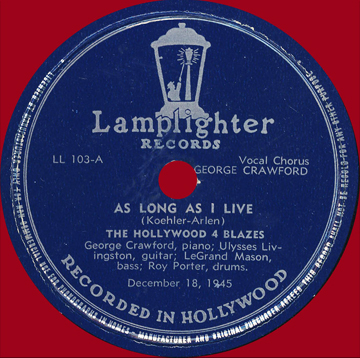
George Crawford (p, voc); Ulysses Livingston (g, voc); LeGrand Mason (b, voc); Roy Porter (d).
Hollywood, December 18, 1945
| LL 103-A | As Long as I Live (Koehler-Arlen) | Lamplighter 103 | |
| LL 103-B | Dark Eyes [instrumental] | Lamplighter 103 |
Lamplighter was run by Ted Yerxa, and named after his column in the Los Angeles Daily News. He had been doing weekly live broadcasts from the Streets of Paris, which yielded plentiful opportunities to recruit musicians to record for him. Lamplighter officially opened in January 1946 ("Another Record Co. Started on Coast; To Do Ad Libs", Billboard, in a story datelined January 26).
An advertisement for the Lampligher release and a Billboard story about the label can be viewed at http://www.vocalgroupharmony.com/3ROWNEW/SnoqJoJo.htm.
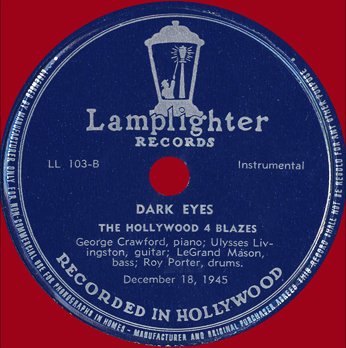
George Crawford (p, voc); Ulysses Livingston (g, voc); LeGrand Mason (b, voc); Connie Jordan (d, voc); Ernie "Bubbles" Whitman (MC).
Hollywood, c. December 1945
| Let's Boogie | AFRS Jubilee 164, AFRS Jubilee 210 |
George Crawford (p, vcl) Ulysses Livingston (g, vcl) LeGrand Mason (b, vcl) Connie Jordan (d, vcl)
C. P. MacGregor Studio, Los Angeles, 1946
| MMo865 | Sunday | Lib. No. 321 | |
| I Don't Know Why | Lib. No. 321 | ||
| Them There Eyes | Lib. No. 321 | ||
| Chicago Boogie | Lib No. 321 | ||
| MMo866 | Honeysuckle Rose | Lib. No. 322 | |
| Rosetta | Lib. No. 322 | ||
| Idaho | Lib. No. 322 | ||
| Undecided | Lib. No. 322 |
A second 8-title transcription of The Hollywood Four Blazes, prepared for radio play, was made by C. P. MacGregor Studio in Los Angeles. This too was a 16-inch 33 1/3 rpm (but not microgroove) disk. The only known copy is in the collection of Dr. Michael Arie, who provided the information shown here. Each side of the disk has a Library Catalog Number in large print, and what appears to be a matrix number in smaller print.
The approximate date for the second 16-inch transcription is 1946.
George Crawford (p, vcl) Ulysses Livingston (g, vcl) LeGrand Mason (b, vcl) Connie Jordan (d, vcl)
C. P. MacGregor Studio, Los Angeles, 1946
| MMo873 | In a Shanty in Old Shanty Town | Lib. No. 329 | |
| You're Mine You | Lib. No. 329 | ||
| I Don't Know Enough about You | Lib. No. 329 | ||
| Exactly like You | Lib No. 329 | ||
| MMo874 | When I Grow Too Old to Dream | Lib. No. 330 | |
| Prisoner of Love | Lib. No. 330 | ||
| What Is This Thing Called Love | Lib. No. 330 | ||
| Ev'ry Time | Lib. No. 330 |
A third and final 8-title transcription of The Hollywood Four Blazes, prepared for radio play, was also made by C. P. MacGregor Studio in Los Angeles, on a 16-inch 33 1/3 rpm (but not microgroove) disk. The only known copy is in the collection of Dr. Michael Arie, who provided the information shown here. Each side of the disk has a Library Catalog Number in large print, and what appears to be a matrix number in smaller print.
The approximate date for the third 16-inch transcription is also 1946.
George Crawford (p, voc); Ulysses Livingston (g, voc); LeGrand Mason (b, voc); prob. Roy Porter (d); Ernie "Bubbles" Whitman (MC).
Hollywood, February or March 1947
| Hit The Ramp, Tramp | AFRS Jubilee 231 | ||
| Oh Boy, That's Where My Money Goes | AFRS Jubilee 231, Swinghouse [Br] SWH-8, P-Vine Special [J] PCD-5779, Document DOCD-5615 | ||
| Chicago Blues | AFRS Jubilee 231, Swinghouse (E) SWH-8, Document DOCD-5615 |
According to Felix Prochaska, Roy Porter was probably in for Connie Jordan on this session.
Swinghouse SWH-8 is a British LP from the 1970s titled R&B and Boogie Woogie. Document DOCD-5615, Secular Vocal Groups Volume 4, is a various-artists CDs from 1998. Japanese P-Vine Special PCD 5779, That's Where My Jive Goes—Best of Jive Vocal Groups 2 came out in 1999. On the P-Vine, the group is misidentified as "The Four Blazes (Chicago)," even though two other items from a previous session by this group are correctly attributed! The Document compilers grouped these tracks with the four numbers that the Chicago Five Blazes cut for Aristocrat; in fact, they identified the LA group as the "Five" Blazes on this occasion—and gave the personnel for the Chicago group.
George Crawford (p, voc); Ulysses Livingston (g, voc); LeGrand Mason (b, voc); Connie Jordan (d, voc); Ernie "Bubbles" Whitman (MC).
McCormack General Hospital, Pasadena, mid-July 1947
| Till Tom Special | AFRS Jubilee 240, AFRS Jubilee 290 | ||
| You Better Watch Yourself | AFRS Jubilee 240, AFRS Jubilee 290 |
George Crawford (p, voc); Ulysses Livingston (g, voc); LeGrand Mason (b, voc); Connie Jordan (d, voc); Ernie "Bubbles" Whitman (MC).
McCormack General Hospital, Pasadena, c. February 1948
| Blue Dip (Blue Light) | AFRS Jubilee 274 | ||
| Eager Beaver | AFRS Jubilee 274 |
There is enough material by the Hollywood Four Blazes to support a comprehensive reissue on the group.
Many thanks to Joseph Scott for pointing out several of this group's recordings and various CD issues thereof; to Dave Penny for helping to resolve the confusion between the Hollywood and Chicago Blazes and identifying the LP releases; to Felix Prochaska for providing dubs and label scans from his collection; to Richard Reicheg for information on the 16-inch transcription 309/310; to Dr. Michael Arie for information on all three McGregor transcriptions, 309/310, 321/322, and 329/330; and to La Grande Mason Jr.
Click here to return to the Red Saunders Research Foundation page.